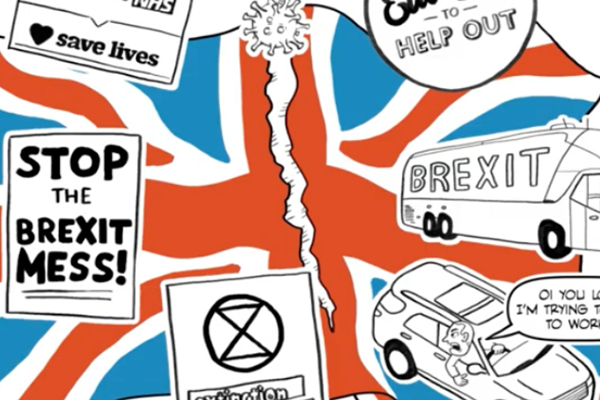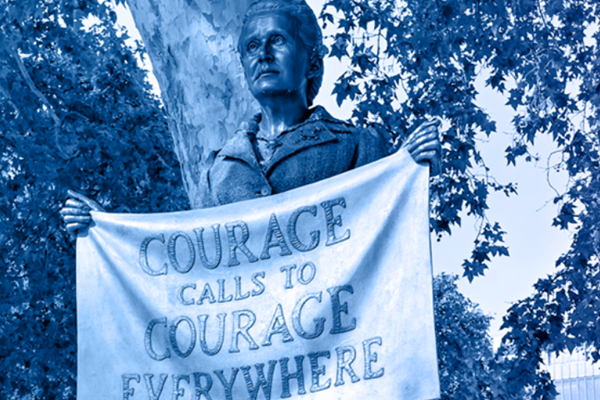Our research into the public’s starting points on international trade in post-Brexit Britain reveals that Britons want to see trade delivering on economic growth, jobs and choice for consumers - and shows a clear path for how they want that to happen.
Politicians have spent a lot of time talking about trade recently – from the much-promised UK-US trade deal to last week’s argument over the winners and losers of the UK-Australia deal. While this is undoubtedly a policy area which mainly animates specialists rather than the public at large, it affects the lives of people up and down the country - the pounds in our pockets, the supplies on our shelves, and the jobs in our communities.
Despite the fact that trade deals are unlikely to be door-step issues in the lead-up to a general election, deploying a newly independent trade policy is key to both Conservative and Labour plans to grow the economy. Indeed, almost seven years after the Brexit vote, delivering on trade opportunities is seen as central to making Brexit work for the UK.
That is why More in Common has conducted extensive research over the past six months into the British public’s viewpoints and priorities on international trade post-Brexit. Our polling and focus groups find that the public expects any new trade deals to provide them with better choice, cost and availability of goods. And in making these deals, the public wants negotiators to stand up for British values and standards on the environment, human rights, animal welfare and food safety. In short, British people want the country to be a serious player in international trade, able to export not just our goods but our values to the world, and to look beyond Europe as we seek to make this possible.
Key findings included:
- A plurality of Britons (45 per cent) think that the UK is pushed around too much in international trade negotiations. This view is held more strongly among Loyal Nationals who are closer to Red Wall voters and more weakly among Established Liberals who are closer to Blue Wall voters.
- The public is clear that they want Britain to stand up for our values and standards even if it means doing fewer trade deals. Trading with countries who have low animal-welfare standards, high levels of pollution and emissions, lax GMO legislation, or weak records on human rights are not prices the public is willing to pay for trade deals.
- When forced to choose between friendshoring and near-shoring, the public is three times more likely to choose friends/countries who share our values (64 per cent) over neighbours/countries who are close to us geographically (22 per cent).
- Half of the public had experienced empty shelves or stock shortages in the last month.
- When forced to prioritise between pursuing stronger relationships with the EU or the rest of the world, the public narrowly opt for the rest of world (43 per cent versus 39 per cent).
Britons and Trade
Many Brits think our country gets pushed around in international trade negotiations – a plurality of Britons (45 per cent) hold this view, and it is a sentiment that is strongest among Loyal Nationals who are closer to Red Wall voters and weakest among Established Liberal voters in places like the Blue Wall.
The public’s priorities for trade
When it comes to the benefits of international trade, the public expects new trade deals to deliver on choice, cost and availability. In MaxDiff analysis, the public says that they would prioritise growing the economy, reducing prices and protecting British jobs, if they were in the trade secretary’s position.
The public prioritises standing up for British values over the volume of deals we do. Across every set of values that we asked about, the public is clear that they want Britain to defend them even if it means doing fewer trade deals overall. In making trade deals, the public wants government negotiators to stand up for British standards and values against those with a track record of low animal-welfare standards, high pollution and emissions, lax GMO legislation, and poor human rights.
Standing up for British standards is particularly true when it comes to protecting farmers and food standards. Only small minorities of the public believe we should make deals that accept food such as chlorinated chicken and 63 per cent of the public say the government should stand up for British farmers, even if this leads to higher prices at home.
As well as protecting standards and values, it is important for the public that the benefits of trade (and post-Brexit trading freedoms) are shared evenly across the country. When asked about future trade deals, the public says the government should only sign those that benefit the whole country, even if it means losing out on some opportunities that would mainly benefit London and the South East. This is true even in those areas, where 60 per cent of people said that the government should walk away from deals that don’t benefit the whole country (compared to 66 per cent for the public as a whole). For the public, levelling up and Britain’s trading policy go hand-in-hand.
The geography of Briton’s vision of trade
When forced to choose between pursuing stronger relationships with the EU versus the rest of the world, more people opt for the rest of the world option. The only segment likely to prioritise a closer relationship with the EU are Progressive Activists, the segment who most overwhelmingly voted to remain in 2016.
More broadly, when forced to choose between friendshoring and near-shoring (i.e. prioritising trading with those who share our values, friendshoring, or those who are geographically closer to us, nearshoring) the public is three times more likely to choose countries who share our values (64 per cent) over countries who are close to us geographically (22 per cent) — this holds across all segments.
Specifically, the public wants to see us trading with Anglophone liberal democracies such as Australia, the US and Canada, over repressive regimes such as China, Russia, and Saudi Arabia. There is also a greater desire for us to pursue closer relations with the Commonwealth than there is for any individual European country other than Ireland.
Britain’s empty shelves
While international trade and supply chain security might usually be abstract concepts, they have become tangible to much of the public in the empty shelves half of the public had experienced within a month of our poll. The public sees a mix of poor government planning, the war in Ukraine and Brexit as the causes of the shortages in our shops, but our evidence shows that this frustration should not be misinterpreted as a sign of weakening support for Ukraine’s fight against Russia. Indeed, overwhelming majorities of Britons think that support for Ukraine is worth the costs it might impose.
When asked what they think will make supply chains more secure in the future, the public is unconvinced that diversification and off-shoring will help. Instead, the public thinks that secure supply chains and fuller shelves are found through making more in Britain.
The public want and expect green tech, high tech, food and pharma industries to grow. A majority think that Britain should focus on developing cutting-edge industries such as pharmaceuticals and green technology rather than attempting to revive older ones such as textiles and car manufacturing. Britons do not take an atavistic approach to industrial strategy. For every segment, more people want to see these new industries developed, with the exception of Loyal Nationals (ie typical Red Wall voters).
The public sees jobs for British people as the advantage of making more in Britain (even in the context of low unemployment rates), alongside decreased reliance on other countries – this is particularly salient for more right-leaning segments. The belief that building things in Britain would lead to more jobs for British people is most strongly felt by segments who fear that international trade will displace British jobs. Trade agreements that make space for British industry to grow will help convince these groups of the benefits of international trade.
Britons see a wide range of barriers stopping manufacturing in the UK. While five out of seven segments agree that NIMBYism is the biggest challenge, there is more divergence among segments about the other barriers. For the more socially conservative segments, a sense that British workers are unwilling to do manufacturing jobs is seen as the key barrier to stopping UK manufacturing. Disengaged Battlers and Established Liberals worry that the UK should focus on what we’re good at rather than trying to make everything, while Progressive Activists and Civic Pragmatists are concerned about trade barriers and natural resources respectively. Despite this broad awareness of the barriers to bringing manufacturing to the UK, there is still a high level of optimism that British manufacturing could stabilise our supply chains and future-proof our economy.
Britain’s relationship with Europe
While a majority of the public blame Brexit for supply chain issues that they are experiencing, our research finds that for the moment the public is more likely to think Britain should still be trying to make a success of Brexit than attempt to re-join the EU and relitigate the debates of the last seven years.
Despite a majority saying they would vote Remain if the EU referendum was now repeated, re-joining the EU before 2030 doesn’t command a majority of voters. High support is mainly driven by the Progressive Activist segment.
However, our research finds that there is space for Labour to pursue a closer relationship with the European Union. Only small proportions of people say they would be less likely to vote Labour if they pursued a closer relationship with the EU, and most say it would make no difference to their support. Strikingly, half the public doesn’t know what Keir Starmer’s EU policy is, and only one in five (19 per cent) can correctly identify that Starmer supports a closer relationship with the EU, but outside of the Customs Union and Single Market.
On the other hand, among those who didn’t vote for Labour in 2019 but are now backing the party, or say they don’t know, a direct pledge to rejoin the EU risks driving them away. Only 22 per cent said it would make them more likely to vote Labour, compared to 40 per cent who said less it would make them less likely to vote Labour.
When we ask the public for a word to describe Britain in polling and in focus groups, the phrase that most often emerges is ‘broken’. Securing trade deals that work for the public and bring jobs and industry to communities across the country is an important way of mending that. But as this research shows, the public wants Britain to stand up for its values and beliefs at the negotiating table, to be confident in who we are, and to export not just our goods and services, but our values as well.
Analysis by Conleth Burns and Ed Hodgson.
| Fieldwork dates | 2nd - 5th December 2023 |
|---|---|
| Interview method | Online |
| Sample size | 2,017 adults aged 18+ |
| Population effectively sampled | All voters, Great Britain (NI excluded) |
| Weighting method | The data is weighted on several measures - age/gender interlocked, education, ethnicity, and region - all to nationally representative proportions. In addition, it is also weighted by 2019 GE vote (of registered voters) |
| Pollster | Public First for More in Common |
| Further enquiries | tyron@moreincommon.com |

